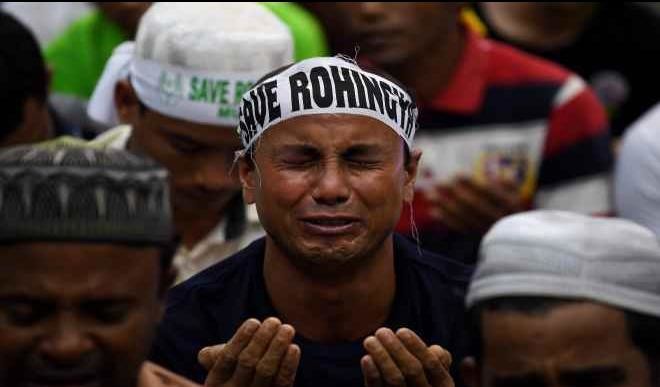Insiders say UN sought to downplay criticism of Myanmar and was hamstrung by China, Russia opposition to firm response.
When Liam Mahony travelled to Myanmar to advise the United Nations on its handling of the Rohingya crisis, the dozens of aid workers he spoke to were almost unanimous in their appraisal of the organisation’s approach.
Their view, the researcher recalls, was “this was all screwed up… this was not going to help the Rohingya population”.
An aid worker who was helping to manage the detention camps in the western state of Rakhine – where the UN and others provide food and other basic necessities to tens of thousands of Rohingya who were forcibly relocated after riots in 2012 – offered Mahony a grim assessment of her role there.
“I just feel like I’ve spent six months as a jailer,” she told him.
While assistance in the camps has saved many lives, Mahony’s research in 2015 and 2017 led him to the conclusion that it also makes the UN and its partners complicit in what he considers a system of apartheid.
The UN has been dogged for years by uncomfortable questions about its approach to the Rohingya.
Senior officials have been accused of downplaying human rights abuses and ignoring the warning signs in the run-up to military-led mass killings that started in August 2017, and sent some 730,000 mostly Muslim Rohingya fleeing across the border into Bangladesh.
An independent review published last week found “systemic failure” in the UN’s handling of the crisis. The report, written by former Guatemalan Foreign Minister and UN Ambassador Gert Rosenthal, was a response to growing pressure for an inquiry.
Myanmar’s intent to commit international crimes was made clear to the most senior levels of the UN, yet no action was taken.
But while some have welcomed the review, others, including Rohingya activists, are angry that Rosenthal failed to hold any individual leaders accountable, instead arguing that “the overall responsibility was of a collective character … it truly can be characterised as a systemic failure”.
“The system failed because individuals didn’t fulfil their obligations,” said Nay San Lwin, an activist with the Free Rohingya Coalition. “This is blaming the system to avoid accountability.”
His group has called for the resignations of UN Secretary-General Antonio Guterres as well as Renata Lok-Dessallien, who held the top UN post in Myanmar until late 2017.
They say that in 2012, Guterres, who was then UN high commissioner for refugees, was told by Myanmar’s then-President Thein Sein of plans to detain Rohingya in camps and asked to facilitate their removal from the country.
While Guterres publicly dismissed the request, the Free Rohingya Coalition says more should have been done.
“Myanmar’s intent to commit international crimes was thus made clear to the most senior levels of the UN, yet no action was taken,” the group said in a statement last week.
‘Softly softly’
Lok-Dessallien was accused of suppressing a report that predicted “indiscriminate” violence in Rakhine and called for urgent action, and isolating staff who raised concerns about Rohingya rights.
A UN spokesperson referred Al Jazeera to the organisation’s statement at the time, which denied the allegations and described Lok-Dessallien as “a tireless advocate for human rights”.
One UN official in Myanmar, who spoke on condition of anonymity, told Al Jazeera that in 2014 Lok-Dessallien excluded staff from a meeting to avoid discussions of human rights that went against her “softly-softly” approach.
The meeting was held in the aftermath of the Sittwe riots in 2014 when Rakhine nationalists ransacked aid agency buildings in a bid to cut off support to the Rohingya. The official said they bumped into a staffer from the UN Human Rights Council waiting outside the meeting who told them: “Renata won’t even let us in the room.”
Dealing with UN officials during this period was like dealing with members of a dysfunctional rich family who despise each other.
Questioning the leadership’s approach made staff unpopular, and some feared for their careers, the official added.
“The UN does not encourage people to step out of line,” the official said. “People take a lot of time to get into and then advance at the UN. They don’t want to give that up easily, especially when they feel nothing may happen anyway, especially with Renata as head.”
A spokesperson for Lok-Dessallien, who is now the resident coordinator in India, did not respond to a request for comment on the 2014 incident.
David Mathieson, an independent analyst who was a senior researcher for Human Rights Watch in Myanmar until late 2016, said the UN was further undermined by in-fighting before the 2017 violence.
“Dealing with UN officials during this period was like dealing with members of a dysfunctional rich family who despise each other,” he told Al Jazeera.
Rosenthal’s report points to a lack of coordination between different parts of the UN as one of the reasons for its failings, but Mahony says that mischaracterises the problem.
“There was actually a very well-coordinated agreement to comply with the government’s constraints,” he said. “It was actually imposed by the resident coordinator and almost all the UN agencies were quite docile about it.”
Diplomatic realities
For all the criticism, it is far from clear whether the UN could have prevented the slaughter. A key obstacle was opposition from China and Russia, both allies of Myanmar with Security Council vetoes.
That, said one diplomat previously based in Yangon, makes it unreasonable to put the blame for the violence on individuals in the UN, even if they did make mistakes.
“If it were a similar situation where there’s a Security Council resolution and strong support from the Security Council and it still went bad, then you’re in a situation where individual accountability makes sense,” said the diplomat, who spoke on condition of anonymity.
“If someone’s converted a strong position into a weak one then you’ve got to ask why, but the UN’s position in Myanmar was always weak.”
Richard Horsey, an independent analyst who wrote the report that Lok-Dessallien was accused of suppressing, agrees that singling out individuals misses the point.
“While there were certainly individual failures, these occurred within a context of serious institutional problems which must be fixed, or those individual failures will keep happening,” said Horsey, who has also served as a senior UN official in Myanmar.
The UN’s approach to Myanmar government mirrored that of the diplomatic community, which was blinded by the reputation of Aung San Suu Kyi, a former dissident who was portrayed as an icon of freedom and became the country’s de-facto leader in 2016.
“I’ve talked with diplomats who made it very clear that ‘we didn’t want to embarrass Aung San Suu Kyi by talking about the Rohingya’,” said Mahony. “She wanted them to ignore it, and they wanted to help her out.”
There are signs that the UN is changing its approach.
In a letter to the government earlier this month, the current resident coordinator, Knut Ostby, threatened to withdraw aid from the camps in Sittwe “beyond life-saving assistance” unless there was “tangible progress” towards granting the Rohingya freedom of movement, according to the Guardian newspaper.
But larger changes are needed if the UN is to protect the Rohingya more effectively.
Rosenthal’s report argues that Guterres should put more pressure on Russia and China, and that they could potentially be convinced to support stationing a team of UN human rights observers in Rakhine state.
Source: www.aljazeera.com

 Join Daily Trust WhatsApp Community For Quick Access To News and Happenings Around You.
Join Daily Trust WhatsApp Community For Quick Access To News and Happenings Around You.


